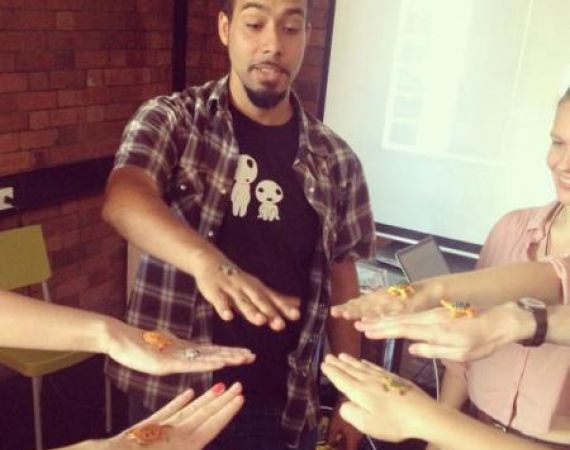Posted on Tue 18 Sep 2012
Slingshot - the difficult second album: Last week's Lunchtime Talk
Friday 7 September saw our program of Lunchtime Talks kick off again after the August break with a corker from Simon Johnson, Studio alumni and co-director of Slingshot. Slingshot are a Bristol based games company with extensive experience in creating games; from mass participation spectaculars to…

Simon demonstrating how to play Turtle Wushu (one of the igfest mini game) - http://ludocity.org/wiki/Turtle_Wushu
Friday 7 September saw our program of Lunchtime Talks kick off again after the August break with a corker from Simon Johnson, Studio alumni and co-director of Slingshot. Slingshot are a Bristol based games company with extensive experience in creating games; from mass participation spectaculars to mobile phone adventures they have created over fifty to date. They are also the founders of Igfest, an international festival of street and pervasive games.
In 2010 Slingshot gained notability when they premiered 2.8 Hours Later, their mass zombie chase game. With 2.8 Hours Later, Slingshot developed a highly popular game, it was the first project the company has successfully scaled and commercialised. With success, however, come new challenges. Simon joined us to talk about 2.8 Hours Later and creating their next large scale game.
Simon opened by talking about the progression of 2.8 Hours Later. The game evolved from a mass participation chase game originally called ‘Journey To The End Of The Night.’ The game was popular, but they felt that at times it lacked structure, so drawing on the most popular elements, and exploring the gating and flow of the piece they created a very early stage 2.8 Hours Later. To date it is Slingshots most popular game, having been played across the country from London to Manchester and regularly selling out at £28 a ticket.
Simon then spoke briefly about Slingshot’s history in developing pervasive games. He said that they had looked at adding a technological element to 2.8 Hours Later, but after a lot of discussion they decided that it wouldn’t enhance the game. He said that although 2.8 Hours Later doesn’t include any technological aspects within it, the success and popularity of the game is due largely to digital platform. He said that a huge proportion of players find out about 2.8 Hours Later though social media channels and word of mouth. The digital platforms are so valuable because when most people that hear about a ‘zombie chase game’ they would instantly dismiss it, but by having the game personally recommended to them, they are more willing to give it a go.
Simon said that Slingshot therefore spend a lot of time and resources concentrating their marketing effort on digital platforms; they respond to comments and encourage dialogue about the game. This online presence has led to a community being built around the game. Players are not just customers; they are part of something larger, something that is tangible and lasts beyond the game.
The community built around the game is beneficial in many ways, firstly it means a lot of their players return each year, normally graduating from players to one of the 200 zombie volunteer team needed for each show, secondly they are invaluable at spreading the word and generating a buzz around the game. In fact some fans are so loyal that they follow the game around the country playing again in each city.
Simon explained that the success of 2.8 has been incredible, and the revenue has enabled the company to create a business plan, build a core team and generate a level of planning that it has never been able to do before. Most importantly, they have managed to go from an arts organisation reliant on public funding to one that has a sustainable business model, as advance ticket sales provide the revenue needed to host the game.
It was therefore a controversial decision to announce that this year would be the last outing of 2.8 Hours Later in Bristol. Simon explained that they made this decision because they felt that it had been overdone in the city. He said that a large part of the enjoyment comes from the unknown routes and hiding places, so when you lose that element you lose the essence of the game.
Having decided to develop a new game Slingshot were faced with some difficult questions: How can the company create a game equally as popular as 2.8 Hours Later? Is it just the zombie genre, or are pervasive games the next big popular cultural form? Using these as a starting point Slingshot identified the following objectives for their new game:
Popular
Entertaining
More automation
Progressive technology
Simon then introduced their new game; Cargo – the orchid remix, collaboration between Slingshot and The Mixed Reality lab at Nottingham University, part of the EPSRC funded ORCHID project.
Cargo pitches you against a system controlled by artificial intelligence that will either help or hinder your progress across the city. You receive instructions, offers and threats through your phone as you try to escape the city, pick up the cargo and make it to the boat. Along the way you'll have to barter for fake ID and outsmart the crooked cops. Watch the trailer here.
Cargo premiered at this year’s Igfest, alongside 2.8 Hours Later and Incitement, developed by Studio Residents Splash and Ripple. You can find more information about Slingshot and all of their games by visiting their website here.